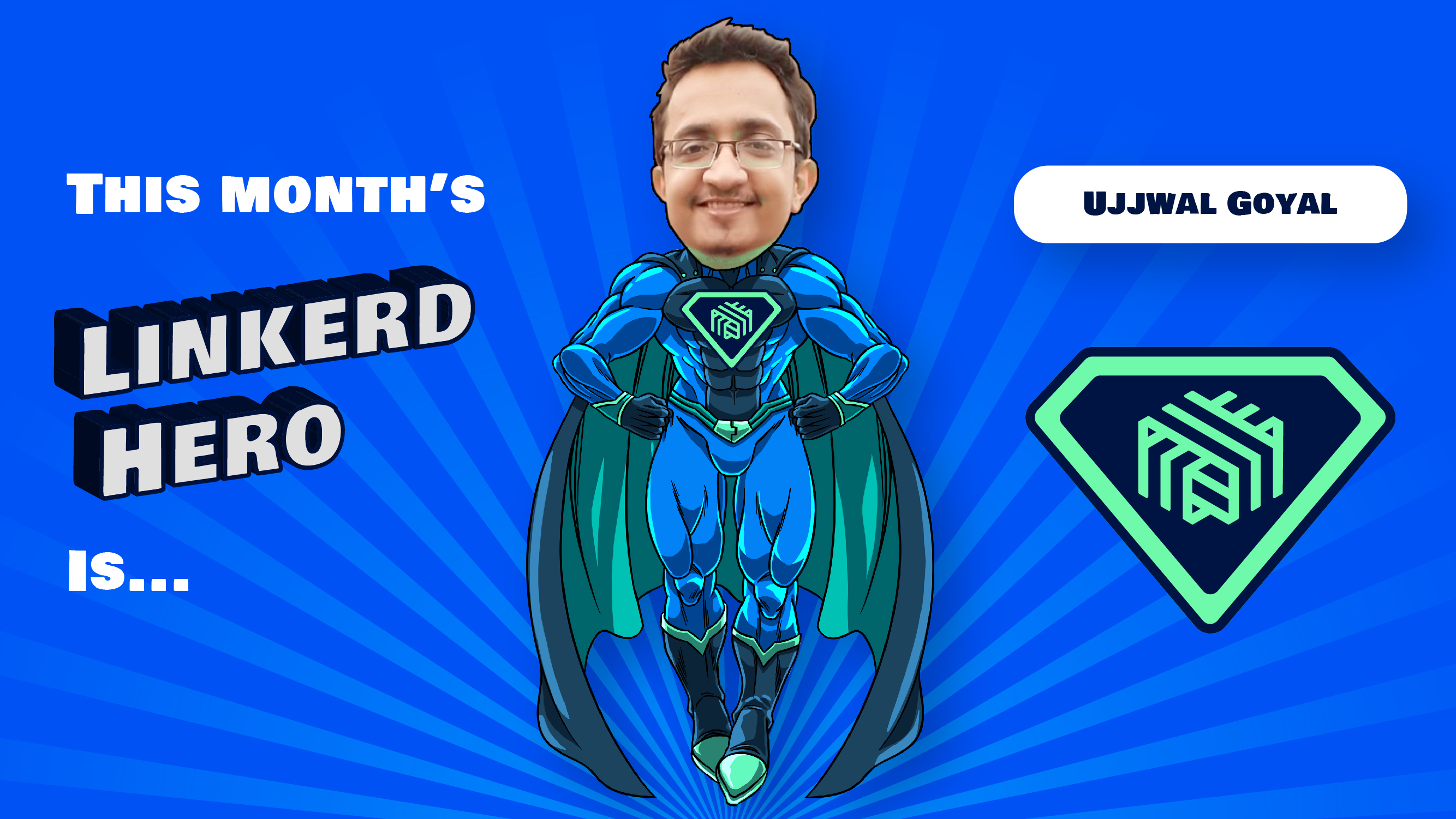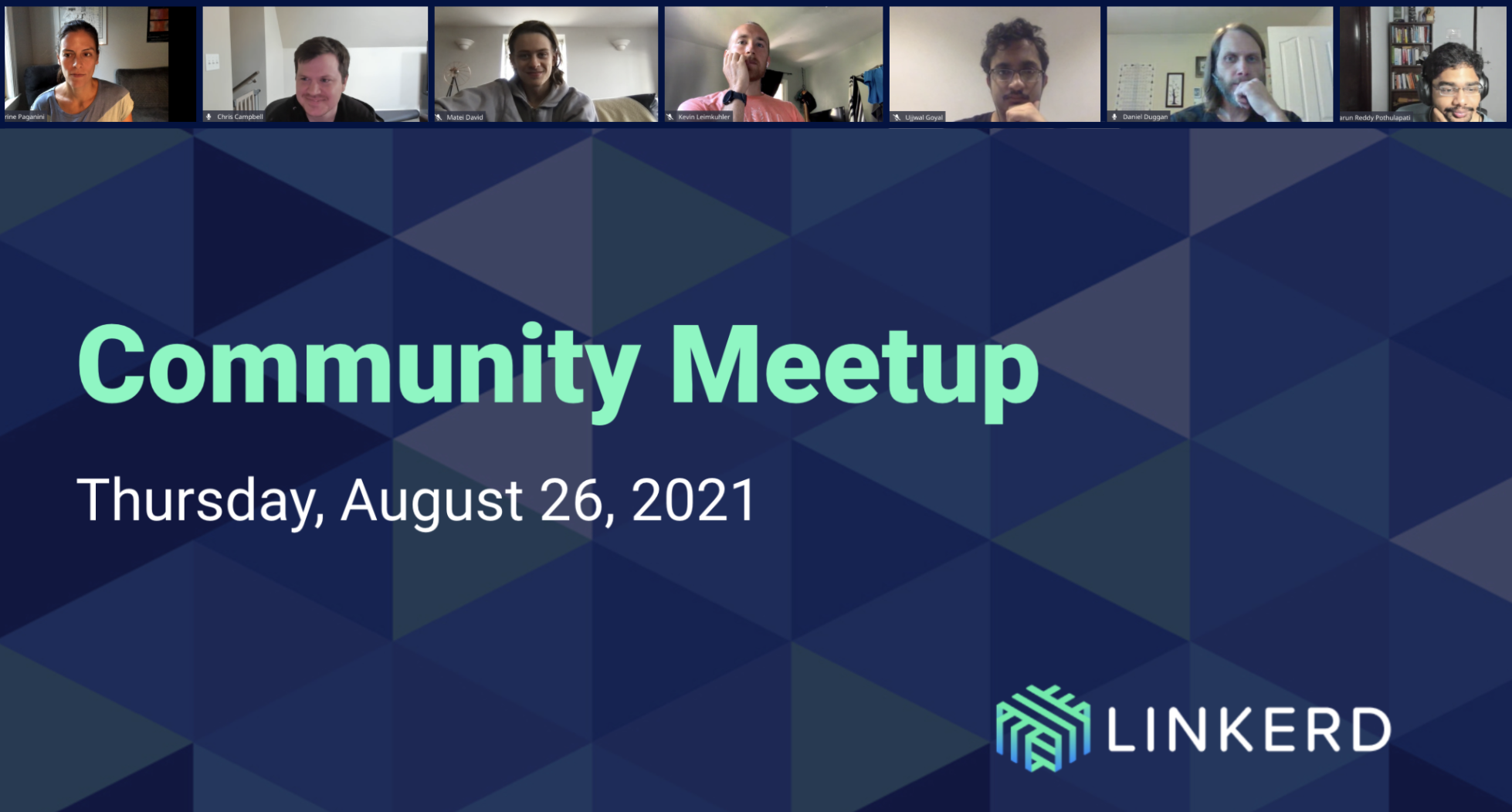
If you missed our last community meeting, don’t worry. Below is a recap along with the recording.
Before we get started, just a quick reminder about our Linkerd Community Anchor Program. If you have a Linkerd story you’d like to share, we’d love to help you tell it. Whether you built a cloud native platform with Linkerd or integrated the service mesh with another CNCF project, these experiences are incredibly beneficial for the community!
At this point, we generally remind you to participate in our 2021 Linkerd survey. But today, we’d much rather have you participate in the CNCF Cloud Native Survey 2021.
Why does your participation matter? Because this survey is the basis of the yearly CNCF report, read by thousands of your peers. If Linkerd users are underrepresented, users further down in their service mesh journey may come to the wrong conclusions. So, if Linkerd has been of any value to you, please take this survey now. Thank you, we really appreciate the support!
News and updates
The world’s first hybrid KubeCon turned out great for Linkerd. Fascinating talks, a big announcement around Linkerd 2.11, and, best of all, we got to see real people again. While exhausting, it was awesome and we hope to see a lot more of you next year in Valencia.
We also launched a brand new workshop series which we kicked off with upgrading to Linkerd 2.11. Up next is a deep dive into Kubernetes mTLS with Linkerd (Nov 17). Register today and join the #workshops channel on the Linkerd Slack for updates and follow-up conversations. Upcoming topics include zero trust, policy, and more.
If you were at KubeCon, you may have already met them; if not, please meet Linky, the gender-neutral blue lobster — Linkerd’s new mascot! A huge Halloween fan, Linky decided to dress up as a vampire during our community meeting Halloween edition.

Roadmap
The 2.11.1 edge release is now live. There are no major feature changes, just a few bug fixes. To upgrade, please ensure you are running Kubernetes 1.17 or higher. One change worth mentioning is that Jemalloc will now function as the memory allocator, reducing memory usage in the proxy.
Looking ahead to 2.12, workload identity will be verified with tokens specifically created for Linkerd that are time- and audience-bound through service account token volume projection. So, instead of a default token, a specific Linkerd token will be added during the injection. This will fix issues where service account mounting is explicitly disabled. Additionally, we are updating the ProxyInit to use TPROXY to preserve source IP. FIPS compliance is also being worked on.
As to 2.12 headline features, they are all still TBD. We are considering mesh expansion and client side policy but are also open to suggestions. If you have any, please raise an issue on GitHub!
Community convo with Eli & Omri
Salt Security’s platform engineers Eli and Omri, joined the meeting to tell us a little about their Linkerd journey. Salt is a company focused on providing API security. Multiple fortune 500 clients rely on their platform to discover security issues around their APIs. It is absolutely mission-critical that their platform works reliably at scale. The platform was built as microservices running on Kubernetes from day one. But, as the company grew and had to work at scale, requirements began to shift. They needed solutions that would help them grow the team and the stack.
Until recently, they used a custom TCP-based protocol for inter-service communication, but this created multiple challenges, including monitoring and the ability to switch languages within services. That’s when the team started looking into gRPC and that triggered lots of other architectural changes.
Why gRPC
gRPC was appealing for two reasons: First, its backward compatibility for growing your schema. Based on protocol buffers, gRPC helps ensure their services can grow without fearing that something will break — this is critical to hitting their high SLA targets!
Second, well, Salt started with the UNIX stack — the same programming languages and the same disciplines — but with a growing company, often you realize that the tool you chose yesterday doesn’t fit your needs today. Currently, they have services in three programming languages, with a fourth language on its way. The advantage of gRPC is that, since it’s based on protocol buffers, you can define these schemas outside of the application code.
Speaking of programming languages, Charles had to ask if they are using Rust. Not yet, but Eli and Omri have experimented with it and regularly read articles on the Linkerd proxy. They primarily code in Go and NodeJS.
Back to gRPC. Kubernetes doesn’t load balance gRPC, so they knew they needed another load balancer. When checking the official Kubernetes documentation, they saw a link to Linkerd and how it could help. Although there were some other solutions out there, setting up Linkerd was easy so they went ahead with the service mesh. While they were only looking for load balancing, they quickly realized all the other features Linkerd offered and were totally sold.
Linkerd in dev environments
Salt’s dev environment is identical to its prod environment — both run Linkerd. They soon realized that, with the dashboard and Linkerd’s Tap and Top functionalities, they could quickly identify bugs before going to prod. Today, Linkerd has become a standard tool of their development process.
Before switching to gRPC, observability was limited. With Linkerd’s CLI and dashboard, the team can now see how requests fail as they make changes. They can also see where clients are excessively interacting with one another which helps identify unwanted behavior. Now, before they go to production, they first check the traffic to see if anything is wrong.
One of their favorite features is Linkerd’s Top functionality. It allows the platform team to understand issues before they turn into problems. It also allows them to easily identify the service owner and flag issues. In short, Top helps them zero in on bugs much faster.
Linkerd feature wishlist
Eli and Omri are big Linkerd fans and really believe in its value. But if there was one feature they’d like to see, it would be circuit breakers — that’s their next goal! And traffic mirroring would be cool, too.
KubeCon Recap
There were a few Linkerd talks at KubeCon, but today, we’ll focus on end-users only as those are the best. Fredrik Klingenberg, Linkerd Ambassador, and Senior Consultant at Aurum AS, shared how he helped replatform Elkjøp, the Nordic retail giant, to Kubernetes and Linkerd.
In his talk, Fredrik explained why learning about tools like Linkerd helps you on your Kubernetes journey, shared ideas and arguments for investing in a service mesh, and how to onboard developers for an organization.
With a 25% market share, Elkjøp’s cloud costs are significant. Through that migration, they were able to reduce these from $450K to $115K. For the full story, check out Fredrik’s CNCF blog how a $4 billion retailer built an enterprise-ready Kubernetes platform powered by Linkerd.
Steve Gray, also a Linkerd Ambassador and Head of Trading at Entain Australia, shared how the online sports betting company 10xed throughput with Linkerd. They migrated an application with 1.7 million lines of PHP code to 347 services written in Go. They selected Linkerd due to its gRPC load balancing ability, because no app code or configuration is required, and due to its observability features. The fact that the cloud/bandwidth cost went down, was a welcome bonus. You can read more about it in Steve’s CNCF blog when LeBron scores, latency matters: Realizing 10x throughput while driving down costs and sleeping through the night.
October Linkerd Hero
And of course, we announced our October Linkerd Hero, Alberto Sadde. As a new member of the Linkerd community, Alberto jumped right into the spirit of the community and helped someone out on Slack when they posted a question in the linkerd2 channel. By sharing his knowledge and experience using cert-manager with Linkerd and ArgoCD, Alberto helped others quickly work past their issues. And because such selfless behavior is invaluable in open source communities, he’s our October Linkerd Hero! Thank you, Alberto, for helping others succeed!
Who is your Linkerd Hero? Submit your nomination today!
That’s it! Hope you can attend our next community meeting on Thursday, December 28 at 9 a.m. PT live. Register today!



